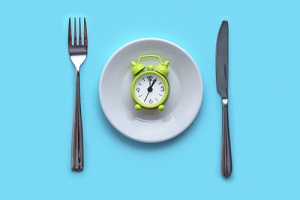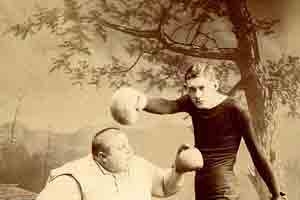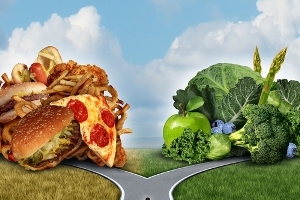5 Fulfilling Ways to Control Your Hunger
How to use science to reduce your urge to overeat

"If I could just eat less, if I could only control my hunger, reign in my gluttony, not be such a pig! People are starving and I wobble around like some aging Jabba the Hut stuffing my face continually!"
Hundreds of millions of people think like this. But should they? Obese people are judged negatively. Even medical professionals are more likely to dismiss them as lazy and stupid (1).
We assume being overweight is caused by self indulgent greed. That piling on masses of body fat is simply caused by eating more than you need. And if people would just eat less (and exercise more of course) then they would be slim and svelte like they should be.
So if over eating is the problem then the solution should be simple - EAT LESS! And because it all seems so simple we look at obese people and judge them as greedy, glutinous, and wilfully self indulgent. But is this fair? Are people who become dangerously obese just plain greedy?
"People are staving so eat your food!"
I used to hear this as a child if I was reluctant to finish what was on my plate.
Possibly for the first time in history there are now more overfed than starving people on Earth.
It was recently estimated that there are now one and a half billion dangerously fat people as compared to one billion people who are chronically under fed and malnourished (2). One billion people go to bed without genuinely having eaten enough at risk of starving to death, including many children, whilst one and a half billion others consume much more food than they actually need. This does seem terrible. And it is. But there is another way of looking at this that tells us something important about the nature of hunger.
Our greedy world
If we look at the similarities between rather than differences between the dangerously obese and the dangerously undernourished we immediately see a connection. Both groups are:
• In danger of dying early because of the way their bodies are being fed (or not fed).
• Both the starving and the dangerously obese are chronically hungry much of the time.
Real starvation is hell, and I don't mean to denigrate the experience of it in any way. But there is evidence to show that both the dangerously obese and the dangerously underfed are both in a sense undernourished. That it's possible to be eating vast amounts and still be starving, still be underfed. How come?
Fat and Starving
Imagine you're stumbling lost through a baking desert. You're literally dying for a glass of water. Imagine now that you have plenty of water with you but all of it is packed full of salt. What would happen? You might drink and drink and drink but the more you drink the thirstier you get. You are drinking gallons of the stuff but just get thirstier! The water you're so frantically swigging isn't just not helping it's making it worse for you.
Can we call you greedy or weak willed because you just keep drinking?
If what you consume doesn't provide your body with what it needs your body will keep you searching for more. Is there evidence that overweight people are overeating not because they are greedy but because their bodies, just like the thirsty salt water drinker, are continually searching for food that will genuinely fill them? Could it be that very obese people (or even just people fattening beyond a certain healthy level) are in fact malnourished? That, crazy as it sounds, fat people are in some way starving?
Internal starvation
Some people are naturally fatter than others. Some are born with more and larger fat cells (3). But hardly anyone should ever become "clinically obese", suffer "metabolic syndrome" with increased risk of type 2 diabetes, heart disease and some types of cancer.
Here's the important bit: It's not how much you eat, but what you eat. It's how much of your food goes to feeding the fat cells in your body and how much goes to feeding muscle and organs. Using this line of evidence, if you mainly eat "fat feeding foods" then your organs and muscles will be starved of nutrition. You will be very fat but constantly hungry because you are only feeding your fat reserves. (4)
And so this thinking continues when you eat the kinds of food that feed your body properly you become less hungry (or in the eyes of a judgemental world less "greedy") People don't tend to eat too much when the food they do eat feeds them properly. People don't tend to drink too much water when it hydrates them properly. So with this in mind, how can you control your hunger and thereby avoiding "breaking" your metabolism and getting or remaining much fatter than you need be?
1) Avoid foods that feed your fat cells
Insulin is your fat storage hormone. If we constantly eat foods that spike insulin levels we can become insulin resistant (which is why obesity and Type 2 diabetes so often coincide). Many of us consume vast amounts of unrefined carbohydrates and sugar which all spike insulin levels leading to energy imbalance and increased hunger for "real food" later on. Limit the consumption of grains (as these are the most quickly digested of starches) and check for sugar levels in all the food you eat.
2) Don't go hungry
You can lose weight by starving yourself in the short term but that is unsustainable of course.
Controlling hunger isn't about going hungry it's about not getting so hungry so that you don't have to exercise will power. Not all calories are the same. Some feed fat almost exclusively and others do not. It's not so much how much you eat but what you eat. And if you are eating the wrong stuff your body will continue to cry out for what it really needs. Remember, in the long term, hunger always wins - it's a matter of survival for your body, and there's nothing more powerful than that. Sure you might deny yourself for a little while but because eating is so intrinsic to survival this is not the way to a healthy weight.
3) Control hunger with healthy fats
We all eat much less fat than we did fifty years ago yet we are all so much fatter (5).
Dietary fat, even healthy fat, has been widely vilified. But there is a mounting body of belief based on evidence that some type of fat in our diet is vital for our wellbeing and staves off hunger. Sugar doesn't have fat in it and yet it's incredibly fattening. You won't find much fat in bread yet because it spikes insulin, too much can leave you hungry and fatter.
When you control your refined carbohydrate, sugar and other insulin spiking foods and drinks (including fruit juice) and eat more healthy fat you not only have less hunger and feel more satisfied, but your HDLP levels (good) cholesterol improves and your LDLP "bad cholesterol" decreases.
When you get enough fat in your diet you tend to eat less than those who try to reduce fat consumption. Fat satisfies hunger and your body needs healthy fats (6). Fat makes you feel full longer and so reduces your appetite. Because it doesn't spike your blood sugar levels by releasing insulin it's much easier to desist from between meal sugary snacks and drinks. I suggest you look into this and see what you think.
When you consume what you really need you will control hunger.
And remember a fat free label doesn't mean the contents won't make you fat. "Fat free" often really means "fattening." Lots of fat free foods are high in sugar and refined carbohydrates perfect if you want to directly feed your fat cells and leave your body crying out for real food. Remember the constantly thirsty salt water drinker in the desert?
4) Don't over exercise
Activity is vital if you want to be healthy and fit but consider this: If you use your car more-perhaps driving it many hours a day will you end up putting more or less fuel in?
Exercising more increases appetite after the exercise. If you have cut our insulin spiking hunger inducing foods then you'll be losing fat anyway but too much exercise will leave you ravenous and make the temptation to eat refined carbohydrates possibly overwhelming. Short intense and relatively infrequent exercise can be much more healthy and appetite controlling than exercising hours every day (7).
5) Address the psychological aspects of hunger
Sugar and unrefined carbohydrates have powerful affects on brain chemistry. In affect they work like drugs in the way they:
- Set up an expectation of a chemical change in the brain thereby creating an internal "reward" for eating them. For a little while we feel good after consuming piles of cake, bread, pasta or cola.
- They have a dramatic come down as the sugar spike is followed by a sugar dip. Like the after affects of some powerful drug this can leave us feeling tired, low and craving another "fix". Again, drinking salty water when you are thirsty might seem to help for a few seconds but just makes you want to consume more.
If eating lots (of the wrong stuff) has been making you hungry then think about weaning off gently so as to normalize your hunger. Notice also times when you feel the most hungry.
If your food has been making you hungry then you might find that times when you would expect to be hungry (such as when you wake up in the morning after having not eaten for hours) you don't want food.
But you feel you want to eat more when you've already been eating a lot. Lots of activities become unconsciously linked to spiking sugar levels such as TV watching and going to the movies. Start engaging in these activities with level blood sugar levels.
For me personally, eating and living as much as possible, in the ways we did before modern diet came on the scene has been remarkably beneficial for my health and keeping access fat to a minimum.
Sugar isn't a food, grains came on the scene a moment ago in evolutionary terms - our ancesters spent millions of years eating healthy animal fats, vegatables and some fruits. Maybe they were drinking pure water whilst we've been trying to meet our needs with the salty stuff.
The vast amounts of vastly obese people are hungry because they are under-nourished. When I use hypnosis to help people control their weight I make sure to encourage healthy behaviours and help instil the confidence that controlling hunger doesn't have to mean going hungry. Quite the opposite in fact.
References
- See: http://www.irishhealth.com/article.html?id=5291
- According to The Red Cross's latest world wide report 15 per cent of people are going hungry in the world whilst 20 per cent suffer from "excess nutrition". It comes from the Red Cross's latest worldwide disaster report.
- According to Kirsty Spalding, PhD, of the Karolinska Institute in Stockholm some people have twice as many fat cells as others and some of the difference may lie in the mothers diet during pregnancy.
- For a brilliant analysis of this see: Gary Taube's book: 'Why we get fat and what to do about it/'
- See: Heini, A.F. and Weinsier, R.L. 1997. Divergent treands in obesity and fat in patterns: the American paradox. American Journal of Medicine 102(3):259-64.
- For a more in depth discussion on healthy fats see: http://www.marksdailyapple.com/fats/
- See: http://www.mint-fitness.co.uk/fitness-articles.html
Get a free hypnosis session with our new Weight Loss app for iOS & Android
Includes our most popular weight loss session free, with the option to upgrade to 10 more sessions.
Get the Weight Loss Hypnosis app for iOS (iPhone or iPad) here or for Android here.








